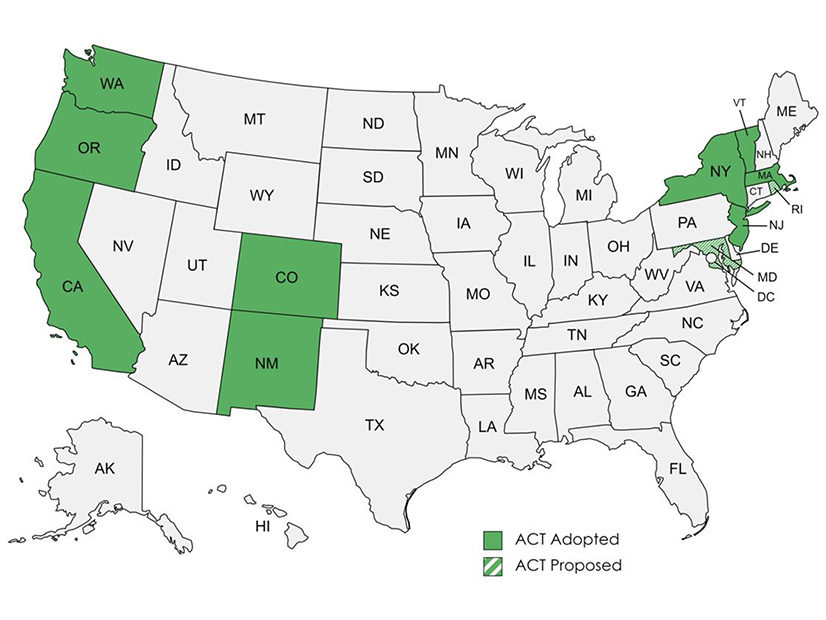
The California Air Resources Board is exploring whether zero-emission truck credits that manufacturers earn under the Advanced Clean Trucks regulation should be transferable among states.
Truck manufacturers say they need the flexibility of credit transfers — also known as credit pooling — to comply with the regulation, particularly in its early years. Advanced Clean Trucks (ACT) requires medium- and heavy-duty truck manufacturers to sell an increasing percentage of zero-emission vehicles each year in states that have adopted the rule.
In addition to California, eight states have adopted ACT: Massachusetts, New Jersey, New York, Oregon, Washington, Vermont, Colorado and New Mexico.
But officials in ACT states say that if the required zero-emission trucks go to other states, they’ll lose out on air quality and climate benefits of the vehicles.
The debate played out during a CARB workshop on Tuesday regarding ACT credit transfers.
“All pathways to achieving our greenhouse gas reduction targets require switching from fossil fuel vehicles to zero-emission vehicles,” said Rachel Sakata, transportation strategies section manager in the Oregon Department of Environmental Quality. “And given the urgency of the climate crisis, it is crucial that this transformation accelerates to scale as soon as possible.”
But Tim French of the Truck and Engine Manufacturers Association said that without credit pooling, manufacturers might have to resort to reducing sales of all trucks in a particular state so they can meet the percentage sales requirement.
“Without credit pooling — and not to be alarmist — there is an increased risk of product shortages in the opt-in states,” French said during the workshop.
James Clyne with the New York State Department of Environmental Conservation said ACT already gives manufacturers flexibility through measures including credits for early ZEV sales, credit banking and trading, and some credit for near-zero-emission vehicles.
“The underlying concern in [ACT] states is that pooling could water down ACT sales requirements,” Clyne said. “Flexibility already exists. It is imperative as a first step to determine whether pooling is warranted at all.”
Clean Truck Partnership
The discussion of pooled credits results from an agreement announced in July between CARB and leading truck manufacturers. (See CARB, Manufacturers Partner to Support Clean Truck Rules.)
Under the deal, known as the Clean Truck Partnership, truck makers agreed to sell as many zero-emission trucks as reasonably possible in every state that has adopted ACT, even if there are legal challenges to the regulation.
In exchange, CARB promised to provide more compliance flexibility in ACT. That includes giving manufacturers three years, rather than one year, to make up deficits in meeting ZEV requirements. CARB also committed to holding a workshop this year to discuss ZEV credit pooling.
CARB released draft text this month for potential ACT amendments, including the increase to three years for making up deficits. CARB staff said their goal is to finalize the rulemaking in 2025.
Light-Duty Rules
Credit pooling is part of CARB’s zero-emission rules for light-duty vehicles, Advanced Clean Cars II. Manufacturers can use excess ZEV or plug-in hybrid credits to meet a portion of compliance requirements in another state. Credits can be transferred only to fill a deficit.
In its 2012 version of Advanced Clean Cars, CARB established east and west regions for credit pooling, with California excluded. Manufacturers faced a 30% premium for transfer between the two regions, according to CARB staff.
But pooling was not included in ACT when CARB adopted it in 2020.
ACT will take effect in California starting with model year 2024 trucks. The effective date varies in other states but starts as soon as model year 2025 in Massachusetts, New Jersey, New York, Oregon and Washington.
CARB announced last month that about 8,900 zero-emission trucks from model years 2021 and 2022 have been sold in California or are expected to be sold based on uptake of incentives. That’s about 60% more than the 5,500 ZEVs that CARB estimates will be needed to meet the model year 2024 quota. (See California Far Outpacing Clean Truck Targets.)



